
For hundreds of couples, the common interests that bring together Booth MBAs have set a foundation for long-term success in life and in love.
- By
- January 10, 2017
- Community

Clayton Rose, ’81, wasn’t necessarily looking for a mate when he enrolled at Booth. But in the back row of Sidney Davidson’s tax class, he found Julianne Rose, ’81, a magna cum laude biology major from Boston College. They quickly discovered one thing in common. “Both of us already had jobs,” Clayton remembered. “We were trying not to get called on.” They postponed dating to concentrate on graduating but quickly met up in New York after starting their financial service careers. He was in shipping finance at JP Morgan, and she worked in health-care finance at Chemical Bank. They recently celebrated their 33rd anniversary.
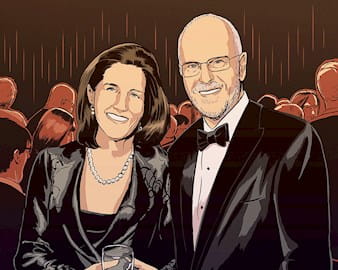
Meeting your mate for the first time in a classroom—or in person at all—may seem, well, quaint in today’s high-tech dating world of Match.com, mobile apps, and swipe left/swipe right. Mating in the digital age is often less romantic than algorithmic. But the data shows that analog dating is far from a thing of the past. And school is an especially popular place to find a soul mate. According to a survey of Facebook users, school remains the top source for finding a spouse. That same study put the median age for first marriage at 27 for women and 29 for men; the median age of a Booth student is 27.8.
Given those numbers, it’s not surprising that an informal look at alumni data finds well over a thousand current couples who either met at Booth, came to Booth as a couple, or followed one another as students. It appears that in romance, just as much as in finance, the Chicago Approach works.
Graduate school is an all-consuming, challenging, stressful experience, and the exigencies of pursuing an MBA could easily derail a relationship. Although students with supportive spouses have lower levels of stress, according to a 2011 study in Training and Education in Professional Psychology, couples with one in grad school full time and the other working risk coming apart at the seams. One is earning money and one is not. One has—or wants—a social life and the other has to study. One may be ready to start a family when the other’s sole focus is starting a career.
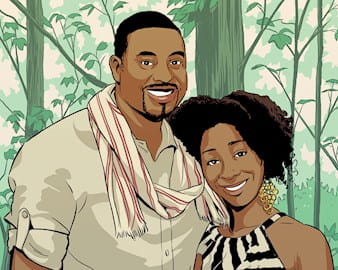
Husband and wife Kenyata Martin, ’09, and Phaedra Martin, ’09, were working at Procter & Gamble in Cincinnati when Phaedra literally woke up one morning and started writing essays to get into Booth. Kenyata was assistant brand manager for Crest toothpaste, in charge of the $65 million African American consumer segment. Phaedra was assistant brand manager for multicultural business development. She had flirted with the idea of an MBA but rejected closer-to-home options as not adequately rigorous. She wanted a classroom experience and a prestigious business school degree, and she had career ambitions beyond her undergraduate chemistry degree. But she had to go part time. The decision became clear, she said. “It was Booth or bust.”
With dual degrees from Morehouse College and Georgia Tech, Kenyata had no desire for more school at the time. “I had an engineer’s mind-set,” he said, “but I also had an engineer’s student loans.” When Phaedra had her grad school “epiphany,” however, his mind-set changed. “With the weekend commute to Booth, if she’s there,” he figured, “I’m sort of in class anyway.” He had come to the realization that the path to the executive ranks at P&G led through marketing, for which he would need more business education. Now the couple was doubling down on “Booth or bust.” “We both had to get in,” he said. “The idea of failure never entered our minds. We never considered one of us getting in and the other not.”
“Like-minded people come together at Booth, people who have a lot in common, who think the same way.”
— Chloe Willstrom
In 2006, both entered the Weekend MBA Program at Booth. During the week, work occupied nearly all their waking hours. “We saw each other for about 40 minutes a day,” Kenyata recalled. “Twenty minutes in the morning and 20 minutes at night.” The four-hour commute to Chicago became their quality time. “We would come in Friday night,” Phaedra said. “Saturday night we’d go out to dinner.” The Martins stayed with Phaedra’s parents in Chicago for “110 weekends,” Kenyata said. Those weekends provided cherished family time that they all still miss.
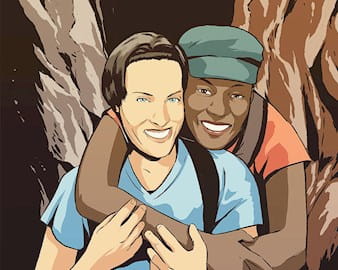
When Chloe Willstrom, ’13, decided to look for the right graduate school, the fact that Booth made her and her partner, Grete Willstrom, ’16, feel welcome as a same-sex couple was a major deciding factor. The two had met in Southern California through a mutual rugby-playing friend and followed their first date with a visit to Niketown for new sports gear. To help get acclimated when Chloe began her studies at Booth, Grete—then working at UChicago as a dietitian—joined the Booth Partners Club, a resource for students in relationships and their partners and children. The club offers everything from organized outings for students with children to job advice for trailing spouses. Via the Booth Partners Club, Grete said, “I was able to network and talk to other people dealing with the same things I was.” The Willstroms got married in 2014.
Community support in dealing with the rigors of business school provides Booth couples a source of stability in their relationships. “The biggest thing I get from Booth on the family side is just having people going through life with me,” said Nicole Shariat Farb, ’09. Nicole met her husband, Michael Farb, ’09, during orientation week at Booth and in several classes they shared during their first year. The Farbs married in 2011. The shared Booth support group carries over for couples such as the Farbs into their postgraduate days. “Our closest friends are Booth friends,” Nicole said. “Many of them are at the same stage of life as we are.”

While Booth has always celebrated the individuality of its students, there are certain personality traits common to students and alumni: intelligence, ambition, competitiveness, curiosity. “The admissions process has weeded out people that you don’t have much in common with,” said Jeffrey Parkhill, ’92. Jeffrey met his wife, Karen Parkhill, ’92, during orientation. They didn’t start dating immediately, and even when they did, they kept their relationship secret for a year. “Grad school is a bit of a fish bowl,” Karen said. “We were both LEAD facilitators and didn’t want people to think we were sticking up for each other because we were dating.” They also didn’t want to end up in the “Dottie” column, the school newspaper’s gossip column at the time.
Chloe Willstrom likens the MBA admissions process to a dating service that uses advanced algorithms. “If you got the pool of the top 10 business schools together, there would be a lot of matches even across schools,” said Chloe, a manager at Accenture in Chicago. “Like-minded people come together at Booth, people who have a lot in common, who think the same way.” And the students who enroll at Booth have also been drawn to Booth by the school’s unique qualities. “It’s not just us selecting the students,” said Donna Swinford, senior director of operations and evaluation for Full-Time students. “The students select us based on the qualities they are looking for, while we look for qualities that will allow students to thrive in our environment.”
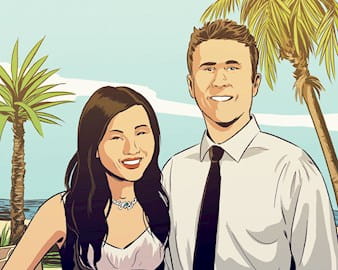
Those attractive qualities of a Booth education convinced Joanne Chen, ’14, and James Hardiman, ’14, to apply together to Booth. A couple since their undergraduate days at the University of California, Berkeley, they met when James challenged Joanne to a game of Chinese chess at a party. “I have no idea why I thought that was a good idea,” he said, but he won. Irked, Chen countered that Go was a “real” game. He bought a board the next day and asked her to teach him to play. They married in 2016, in a ceremony officiated by Stacey Kole, PhD ’92 (Economics), deputy dean for alumni, corporate relations, and the Full-Time MBA Program and clinical professor of economics.
Chen and Hardiman both had five years of work under their belts before they each decided to get an MBA. They were not necessarily considering the same schools; yet in the end, both settled on Booth as the ideal fit. “When you go to a professional school, there’s a stronger filter for people with a similar worldview,” said Hardiman, partner at Bay Area venture capital firm Data Collective. “Going to business school is kind of like dating,” added Chen, a partner at Foundation Capital, another Bay Area VC firm. “It became clear where I fit in. Booth is a good combination of intellectual curiosity, kind of nerdy as a result, but still very extroverted and social, without being overly polished. There’s a genuine feel to the Booth students, a little bit of Midwestern charm combined with the IQ and EQ.”
With two ambitious, high-powered individuals in the same household, careers won’t always run on the same track. The Parkhills had a long-distance relationship between graduation and marriage. Grete Willstrom quit a job she loved in Southern California to follow Chloe to Chicago.
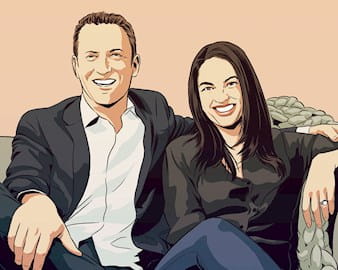
It can be a delicate balancing act early in a career, when both partners are forging paths that may not follow the same map. When Michael Farb entered the Edward L. Kaplan, ’71, New Venture Challenge in his second year at Booth, he asked Nicole to bring her marketing skills to CaptainU, the sports-recruiting software company he cofounded with Avi Stopper, ’06. The CaptainU venture tied for top honors, earning a $25,000 prize. That check is the only outside money he’s taken for the bootstrapped start-up. After getting her MBA, Nicole moved to the Bay Area to begin working for Goldman Sachs; six months later, Michael followed Nicole out west, as he continued to build up CaptainU. “The original CaptainU office started in our living room,” Nicole said. “It quickly moved out, but it started there.” In late December 2016, Frisco, Texas–based Blue Star Sports acquired CaptainU, with Farb and Stopper stepping into executive roles at Blue Star Sports while continuing in their CaptainU roles.
“Ideas compete at Booth, and people collaborate. You actively help those around you be successful. This is not about you; it’s about the community being successful.”
— Donna Swinford
While at Goldman Sachs, Nicole met the founders of Pinterest during one of their early-stage funding rounds. She learned that DIY was their largest category. “I’m a crafter, and I didn’t like the way they were doing DIY,” Nicole said. She began interviewing customers outside of Michaels crafts stores, and hatched the idea of a DIY community where people can find and share tutorials. Nicole launched her venture, Darby Smart, in 2013. The thought of two entrepreneurs in the boom-or-bust world of Silicon Valley might give many couples pause. “I was leaving a really, really stable job that paid me pretty well to go and start Darby in a coffee shop with my cofounder,” Nicole said. Michael was “incredibly supportive.” In December 2016, the Darby Smart DIY how-to video platform reached more than 40 million people. Nicole recently launched an app for Darby Smart, an intense 16-week process that she likens to launching a second company. During that process, Michael has taken the lead with the couple’s twin boys. “In terms of balance, I would say this is a time where I am probably less helpful on the life side,” said Nicole. “But that ebbs and flows. Mike and I are really good about dealing with that.”
Clayton and Julianne Rose have taken turns in their careers. After Booth, they both moved into financial services careers in New York. In 1985, they relocated to London, where Clayton worked for JP Morgan, while Julianne stepped off the career track to raise the couple's two sons. When they returned, this time to New Jersey, Julianne spent 12 years in public service—first on the school board and then on the town council—something she had never thought of doing, and a change of course that became “one of the high points of my career,” she said. In 2003, after 20 years in finance, Clayton went back to school to earn a master's and a PhD in sociology. He taught at Harvard, while she served on the board of an education foundation in Brookline, Massachusetts. Clayton became president of Bowdoin College in 2015, and Julianne opened a women’s accessories shop, J. Rose. “Did I ever think we’d be where we are?” Julianne asked. “No. We say, ‘I think I’d like to try this.’ For both of us, having a partner be supportive makes it possible.”
For Jeffrey Parkhill, Booth offered a path out of accounting. “I did not like being a CPA,” he said. That was the extent of any postgraduation plan. Karen, on the other hand, had fairly clear ideas of a postgraduate career in finance in New York City. She rose quickly from JP Morgan’s investment bank to become CFO of several large corporations. Last year, she became executive vice president and CFO of Medtronic in Minneapolis. Along the way, her successful career gave Jeffrey the flexibility to follow in his family’s entrepreneurial footsteps. He founded Parkhill Development, now based in Minneapolis, in 2000. “I wasn’t sure Karen would work forever,” he said, “so I jumped out of the corporate career sooner than most would to take advantage of her stable income while starting a new venture.”
Booth’s educational philosophy emphasizes the collaborative effort toward a common success, what Swinford describes as the “pay-it-forward” culture at Booth. “Ideas compete at Booth, and people collaborate,” Swinford said. “You actively help those around you be successful. This is not about you; it’s about the community being successful.”
That philosophy has ancillary benefits for Booth couples, helping them balance competitiveness and collaboration. Grete and Chloe Willstrom are both former rugby players, but competition on the pitch never pushed over into the home. “Chloe wins most of the arguments,” said Grete, now at Chicago-based AbbVie, in the data science division. “My negotiation skills have gotten much better. I know how hard to push and when to back down.” Working in venture capital in the Bay Area, Chen and Hardiman live and breathe a work environment that is long on networking but short on sharing. “There is no team dynamic in venture,” Chen said. “For most people, there is this guarded attitude and a persona because you have to showcase yourself. Having a significant other who understands this provides the only place where I can be completely honest about what I’m thinking.”
Thanks to his experience launching CaptainU, Michael Farb could offer guidance to Nicole on launching her start-up. But to Michael, offering support is key today. “Our relationship has gotten less about giving each other advice on things,” Michael said. “It’s more about just being supportive and helping that person work through the challenges that she has or I have in front of us on that given day.”
Phaedra and Kenyata Martin took a marketing class together in their first quarter at Booth. He got an A+ and she got an A. “She was pissed . . . even though it makes no difference to a grade point average,” Kenyata said. “I thought, ‘We’re never going to survive if this keeps up.’” Phaedra’s competitive streak is no surprise, given that she went to the University of Illinois on a full-ride gymnastics scholarship. “Her entire life has been lived between 9.5 and 9.8,” said Kenyata, now marketing director, innovation, at Nestlé in Cleveland. “Phaedra wants to win every battle.” The Martins learned that the trick wasn’t competition but complementarity. Phaedra's attention to detail complemented Kenyata's big-picture view. That synergy enabled them to take other classes together and team up to achieve strong grades for both, said Phaedra, who is currently pregnant with the couple’s third child.
Karen Parkhill finds her entrepreneur husband to be a good sounding board when challenges arise in her career with large corporations. “He’s able to give sage advice because he has an MBA from Booth,” Karen said.
Perhaps most importantly, the Booth community provides inspiration that helps Booth couples ride successfully through life’s changes. “Booth students are incredibly diverse in their approach to life and career, what success means, how people choose to live their lives,” Clayton Rose said. “It gives you the notion that if you do your thing in the best way you can, it will lead to what’s best for you. Jerry Garcia said, ‘Life is a long, strange trip.’ You experiment; you try things. You talk about it. You make the big decisions together.”
We'd love to hear your Booth memories, stories, connections...everything.